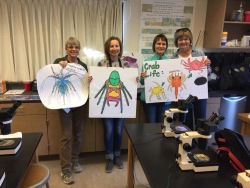Two Aquariums conclude a cooperation agreement

An exchange of experience and a signed Agreement on cooperation in the fields of education and visitor engagement are among the major outcomes of the visit made by staff members of the Primorsky Aquarium to the one of the world’s largest aquariums – the Monterey Bay Aquarium (Monterey, CA, USA).
“Our American colleagues invited us intending both to present their recently opened education center as well as their programs to us and to learn about the progress the Primorsky Aquarium had made in raising environmental awareness over the 3-year period,” said Olga Shevchenko, Head of the Environmental Education Service. “We were delighted with the friendliness and openness of the American counterparts, and we were highly impressed with the scope of activities covered by their education programs.”
“We had an opportunity to compare the approaches used by the Aquariums in teaching ecoliteracy. At the Monterey Bay Aquarium all children’s programs are provided free of charge; the youngest participants are 3 years old,” Olga Shevchenko went on. “We attended a program for small children: each preschooler was accompanied by his/her parent, and the adults were also involved in the learning process. Though developed for very young kids, the program explained a complicated concept of a kelp forest community and was held at the appropriate level.”
The Primorsky Aquarium representatives were especially enchanted with the way the educator delivered information to small children: she managed to retain the kids’ attention and interest, including through her acting skills, for an hour.
“In addition to their work with children, the Monterey Bay Aquarium has a number of programs aimed at popularizing science: it collaborates closely with US scientists who communicate the data on the most recent scientific developments and discoveries to the Aquarium, and its educators put the information into a form accessible and attractive to school children,” said Natalia Miroshnikova, Head of the Education Department at the Primorsky Aquarium. “Inspired by this example, we have decided to set up an education program for children based on the results of scientific research conducted by the A. V. Zhirmunsky National Scientific Center of Marine Biology. We have also taken notice of how science education videos are shown at the Monterey Bay Aquarium. During a screening of a documentary the educator comments on it, and visitors like this manner since it enables them to immediately ask questions and get answers.”
In their turn, the specialists of the Primorsky Aquarium gave a presentation on their education programs to the Monterey Bay Aquarium counterparts who paid much attention to the project focused on children with disabilities.
“Nowadays a high emphasis is placed on the inclusion of special needs children into mainstream environment. The Primorsky Aquarium provides two types of activities for these kids: individual work and group work,” said Olga Shevchenko.” We neither give children medical treatment nor correct them, we try to socialize them during our learning sessions. We have obtained good results in working with children that suffer from autism spectrum disorders. The American colleagues took an interest in our expertise in dealing with such kids and asked us to share the programs with them. We hope for active cooperation between our institutions in this field”.
Ecoliteracy teaching targeted at making the public aware of the global problem of ocean pollution with man-made debris (in particular, with plastics) is another promising area for cooperation that responds to the challenges of today and tomorrow.
“Our both countries are connected by the Pacific Ocean, and this visit has helped us to understand that despite different languages and mentalities, environmental education offered to American and Russian children discusses the same issues using similar teaching techniques,” added Olga Shevchenko. “Our joint efforts can give the next generation a chance to avoid mistakes which were made in the past. We do not simply educate people – our mission is to make it so that the earth will become a cleaner and healthier place.”
One of the steps towards fulfilling this mission is a planned collaborative project on marine plastic litter monitoring on the opposite shores of the Pacific Ocean. Within this undertaking children will carry out beach litter surveys and analyze the collected debris together with environmental experts. Participating in the project, children will learn what it means to bear practical responsibility for the huge ocean whose shores we share.